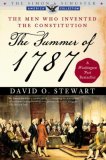Summary | Excerpt | Reviews | Beyond the Book | Readalikes | Genres & Themes | Author Bio

Critics' Opinion:
Readers' Opinion:
First Published:
Apr 2007, 368 pages
Paperback:
May 2008, 368 pages
 Book Reviewed by:
Book Reviewed by:
BookBrowse Review Team
Buy This Book
Chapter Four
Demigods and Coxcombs Assemble
MAY 1787
James Madison reached Philadelphia on May 3, ten whole days before any other delegate (except for the ones who lived there), and eleven days before the Convention was scheduled to begin. His early arrival reflected both his eagerness and his lifelong habit of exacting preparation. Always gentle with his health when he could be, the Virginian gave himself ample time to recover from the grinding stagecoach ride from New York, where he had been representing Virginia in the Confederation Congress.
Although Philadelphia was the nation's largest city, home to about 40,000 people, lodging was at a premium. In addition to the Federal Convention (as it was called), the city was hosting a gathering of Presbyterian ministers from around the country. Also in town was the Society of the Cincinnati, an organization of Continental Army officers that some feared as a political force. The Pennsylvania Herald took pride in the confluence:
Here, at the same moment, the collective wisdom of the continent deliberates upon the extensive politics of the confederated empire, an Episcopal convention clears and distributes the streams of religion throughout the American world, and those veterans whose valor and perseverance accomplished a mighty revolution are once more assembled. . . .
Madison settled in at Mrs. House's boardinghouse at Fifth and Market, where Virginians on public business often stayed. It was familiar ground. Madison had lodged with Mrs. House in 1783 during his first term in the Confederation Congress, and the quiet, serious Virginian was little trouble. As one contemporary described him, "His ordinary manner was simple, modest, bland, and unostentatious, retiring from the throng and cautiously refraining from doing or saying anything to make himself conspicuous." Another attributed to him "an air of reflection which is not very distant from gravity and self-sufficiency," but also found "little of that warmth of heart."
In the ten days until the next delegate arrived, Madison could review the two essays he had written in anticipation of the great convention. The first was an examination of republics and confederacies throughout history, including Belgium, Switzerland, and Germany, along with classical examples -- the Lycian, Amphictyonic, and Achean republics. His second essay, called "Madison's Vices" in ironic tribute to its author's undoubted virtue, was an incisive catalog of the infirmities of the Articles. The vices numbered eleven, and the remedy for all of them was a strong central government. The Virginian was keenly aware of the risk that strong governments may take oppressive measures, as the British Parliament had. His goal was a government that not only was strong, but also would respect the rights of its citizens.
For Madison, the accommodation of competing forces was the central job of government. "All civilized societies are divided into different interests and factions," he wrote, including "debtors or creditors," "rich or poor," "members of different religious sects," "followers of different political leaders," "inhabitants of different districts," or "husbandmen, merchants or manufacturers." Government must be "sufficiently neutral between the different interests and factions, to control one part of the society from invading the rights of another."
During those ten days on his own, Madison did more than plan for the coming conclave. Correspondence from home forced his attention to his responsibilities as a slave owner. Had other servants or slaves assisted the escape of Anthony, a runaway brought back to the plantation? Madison had to judge the case from afar. He also called on Dr. Benjamin Franklin, his fellow delegate and recently installed as president of Pennsylvania. Feeling his eighty-one years, Franklin went out little but was happy to receive guests in his garden, particularly under a favorite mulberry tree. Knowing of the slight Virginian's role in pushing for the Convention and of his relationship with Washington, Franklin extended to the younger man the respect warranted by both.
Copyright © 2007 by David O. Stewart





The Funeral Cryer by Wenyan Lu
Debut novelist Wenyan Lu brings us this witty yet profound story about one woman's midlife reawakening in contemporary rural China.
Your guide toexceptional books
BookBrowse seeks out and recommends the best in contemporary fiction and nonfiction—books that not only engage and entertain but also deepen our understanding of ourselves and the world around us.